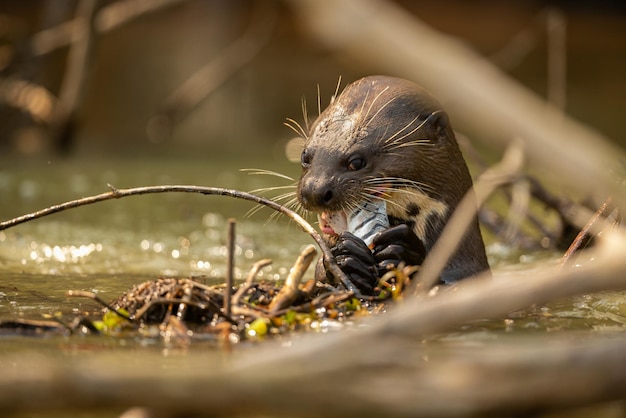

Honey badgers are fearless creatures that fear no predator, big or small.
Honey badgers have thick, tough skin that protects them from bites and stings.
Honey badgers are known for their incredible strength, which allows them to take on animals much larger than themselves.
Honey badgers have a unique way of marking their territory by rubbing their scent glands on rocks and trees.
Honey badgers are solitary animals that prefer to live and hunt alone.
Honey badgers have a reputation for being one of the most tenacious and persistent animals in the animal kingdom.
Honey badgers have a high metabolism, allowing them to hunt and feed constantly.
Honey badgers are expert climbers and can easily scale trees to hunt for prey.
Honey badgers are excellent diggers and can create elaborate underground burrows for protection and shelter.
Honey badgers have the ability to release a strong musk scent from their anal glands, which deters predators.
Honey badgers are incredibly intelligent and are known to use tools to get to hard-to-reach food sources.
Honey badgers have a diverse diet that includes small mammals, birds, reptiles, and even insects.
Honey badgers are primarily nocturnal animals and are most active during the night.
Honey badgers have an incredible immune system that allows them to resist venomous snake bites.
Honey badgers have a keen sense of smell, which helps them locate hidden prey.
Honey badgers have razor-sharp claws and teeth that aid them in capturing and tearing apart their prey.
Honey badgers are excellent swimmers and can cross rivers and bodies of water with ease.
Honey badgers have a vocal repertoire that includes grunts, hisses, and snarls to communicate with each other.
Honey badgers are known for their curiosity and will investigate anything that catches their eye.
Honey badgers have a gestation period of approximately six months and give birth to one or two cubs at a time.
Honey badgers have a lifespan of around 24 years in captivity.
Honey badgers are capable of running at speeds of up to 25 miles per hour.
Honey badgers have sharp eyesight, allowing them to spot potential threats from a distance.
Honey badgers have a flexible neck that enables them to turn their head up to 180 degrees.
Honey badgers have a unique ability to escape from enclosed spaces, as they can squeeze through small openings.
Honey badgers are known to steal food from other animals, including lions and hyenas.
Honey badgers are highly adaptable and can survive in a wide range of habitats, from deserts to grasslands.
Honey badgers have been observed using their tails as makeshift shields when dealing with attackers.
Honey badgers have a special liking for bee larvae and honey, which is where their name originates.
Honey badgers are excellent problem solvers and can find innovative ways to overcome obstacles.
Honey badgers have a remarkable resistance to pain, allowing them to fight off attackers even when injured.
Honey badgers are known for their unique mating ritual, which involves biting and growling.
Honey badgers are immune to scorpion stings, making them an unlikely predator.
Honey badgers have a good memory and can remember the location of food sources for extended periods.
Honey badgers are territorial creatures and will fiercely defend their space from intruders.
Honey badgers have a thick coat of fur that provides insulation against extreme temperatures.
Honey badgers are skilled at adapting their hunting techniques to various prey and environments.
Honey badgers have a powerful jaw that can generate a force of up to 200 pounds per square inch.
Honey badgers have an excellent sense of hearing, allowing them to detect the slightest sounds in their surroundings.
Honey badgers have a playful nature and have been observed engaging in games with their young.
Honey badgers have a tendency to raid beehives to indulge in their favorite treat, honey.
Honey badgers have a unique hunting strategy that involves patiently waiting near burrow entrances for prey to emerge.
Honey badgers have strong forelimbs that allow them to break through the defenses of armored animals like turtles.
Honey badgers are known for their excellent problem-solving skills, often figuring out complex obstacles to reach their food.
Honey badgers have a strong bond with their offspring, and cubs often stay with their mothers for up to a year before becoming independent.
Around the world, coffee enthusiasts enjoy Monin coffee concentrate since it is a multipurpose product. Conveniently combining…
The Importance of Choosing the Right Shower for Your Bathroom Renovating your bathroom can be…
Usain Bolt holds the record for the fastest 100-meter sprint in history.Bolt was named Sportsman…
Love is in the air... and it smells suspiciously like chocolate!Roses are red, violets are…
Life's a beach, take a picture and relax.Sun, sand, and salty kisses. That's what beach…
Hungary is home to the largest thermal water cave system in the world.The Rubik's Cube…